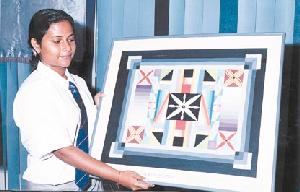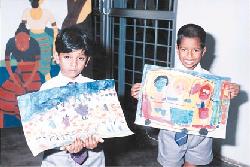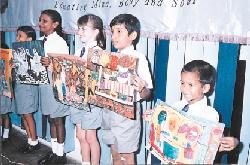
29th April 2001
News/Comment|
Editorial/Opinion| Plus|
Business| Sports|

Books
A staggering work of heartbreaking genius
What do you do if both your parents die when you are 22? And it's you who's left to look after your eight-year old brother?Well, if you're journalist Dave Eggars, you write a book called 'A Heartbreaking Work of Staggering Genius'. OK, the title might be setting him up for a big fall, but while the book isn't really of the 'Staggering Genius' level, it is pretty good.
Dave and his younger brother Toph live in a state of perpetual juvenilia, eating what they like, sleeping where they like and generally spending their parents inheritance. While this might sound like an essay in irresponsibility, struggling journalist Dave actually has big difficulties in bringing up his brother right, worrying about everything from fascist child-welfare agencies to molesting babysitters.
In the meantime he's trying to start up his own hip, post-modern magazine
and trying to get on MTV's 'Real World' TV show; but along the way his
perceptions and internal musings form the basis of a thoughtful book about
what it's like to be an unwilling parent in a media-saturated age. Reaching
to a climactic ending, Eggars manages to be both wry and sincere at the
same time. No small feat in these jaded times.
Celebrating colour



The junior and senior school students of the British School in Colombo present 'A celebration of colour', an exhibition of their paintings at the Barefoot Gallery from May 2 to May 5.
'Ambassador' for Sri Lanka
By Laila Nasry
"International trade, terrorism, peace keeping, nationalism..." Dinal Edirisinghe's eyes sparkle as he recalls his amazing week in Washington, as a delegate of the Presidential Classroom and 'ambassador' of Sri Lanka."There were 400 delegates from 39 countries," says Dinal who headed the 10- member Sri Lankan delegation who were later joined by 10 other Americans role playing for Sri Lanka. Held at Georgetown University, the Presidential Classroom is a summit based on international relations and diplomacy. Partly funded by the Rotary Club, it is open to students between the ages of 16-19 years.
Keen on corporate affairs Dinal picked international trade as his area of specialisation. "I read Central Bank reports and met with the Chairman of the Chamber of Commerce as I had to have an accurate and thorough knowledge before I left." At the summit in the international trade working group it was his 'business' to look after Sri Lanka's interests.
However Dinal was faced with the situation of Sri Lanka being relatively unheard of though "they did know Ceylon tea". Starting from the placing of Sri Lanka on the world map Dinal had to brief the delegates on our country. With those who had heard of it, the image was that of a small, rather poor, war torn country, which Dinal had to put right.
Working with the rest of the group, dominated by 'developed' nations, Dinal had to constantly push for reduced interest rates, loans etc. "But they were very sympathetic and did a lot to entertain the demands of the third world countries."
For a good part of the week the working groups focused on forwarding their respective communiques. "At delegation meetings we'd meet up with the rest of our delegation and discuss matters brought up at each of our working groups and whether they fit in with our country's standing in the international community."
On the last two days of the summit the entire delegation voted on the communiques forwarded by each group. On the first day's voting the groups get an indication as to the support their communiques receive and try to make compromises to win over the rest. "It takes a lot of nerve to defeat a communique," Dinal says adding that Sri Lanka defeated the one on nationalism, "because it justified terrorism."
On March 31 Dinal was one of five chosen to speak a few words at the final banquet before fellow delegates and other special invitees including members of the United States Senate. "I was so excited that I could do nothing constructive after I heard the news. It was the next day that I sat down to write my speech and I got a standing ovation," he says beaming.
But it was not all work and no play for Dinal who was introduced for the final banquet speech as "the Sri Lankan who could do the salsa," having learnt it from the Latinos at the summit.
"We taught them the baila," he says with a laugh. "We were known as the noisiest delegation, and constantly atop the chairs in the student lounge singing the Baila while they'd salsa to it. But the songs had to be fast and catchy."
The experience has very much broadened Dinal's horizons. "I used to
hate to travel," he admits matter of factly, "but not anymore. The experience
was wonderful, so diverse and unifying."
Do you know your Garage?
The original Garage that reached the U.K. was a soulful house type of sound but with a much harder and abstract edge ......... Since then it has evolved and been recreated going through Speed Garage (A.K.A Sunday) era which was Garage music with deep reggae style bass lines to Two Step Garage.By Ranidu Lankage
When you think of the word garage the first thing that no doubt, comes into your mind is that dusty old place you park your car in. But in the recent past there has been a redefining of the word in terms of music."Garage" as it is known is the newest craze in dance music. "It's excellent, I love the Hi-hat work," said popular musician Bathiya when asked about his thoughts on Garage. "It's the most modern and extreme form of drum and bass co-ordination." DJ Tom Hart of Yes FM also had similar views. "It's electric drum and bass \ break beat with melodic vocals (sung or rapped raga style)."
Meanwhile abroad Garage is seen as a continuation of disco music or an electronic version of "The sound of Philadelphia". Having taken its name from the former New York nightclub, "Paradise Garage", this type of music actually originated in the U.S in the early 1980s but it remained very much a fringe movement until it crossed the Atlantic and reached the shores of England in the early 1990s.
The original Garage sound that reached the U.K. was soulful house type of sound but with a much harder and abstract edge to it rather than traditional sounds of disco music. Since then Garage has evolved and has been recreated in terms of sound going through the Speed Garage (A.K.A Sunday) era which was Garage music with deep reggae style bass lines (popularized by Armend Van Helden -popular DJ of the U.S.), hip-hop break beats and extremely full sounding vocals. Since the explosion of Speed Garage in 1997 in the U.K. dance music scene, Garage has further evolved to its most modern form "Two Step" Garage.
Two Step has furthered Garage's inclination towards soul music with more melodic bass lines - rather than the hard ragga bass lines of Speed Garage - and also the extensive use of soul chords with a light Skippy Hip-hop \funk break beat. Another signature of Two Step is the extremely catchy lyrics highlighted in many of today's summer garage anthems.
Talking about modern Garage\Two Step artistes, one band that straightaway comes to mind is the Artful Dodger. These two guys out of west London redefined Garage and brought it into the mass market putting it in everyone's mouth around the world. Their sound incorporates jazz and R&B. Their album "It's all about the stragglers" has been a top seller in the UK album chart ever since its release late last year and has spawned Top 10 hits like 'Please don't turn me on', 'Moving too fast', 'Woman trouble' and 'Re-Rewind'.
Next is Craig David who is known as the "Golden boy" of U.K. Garage. With his smooth, soulful voice he has managed to win the hearts of many here and abroad proven by the responses of many fans of Garage music who said that they actually started liking Garage after listening to him. Craig's album "Born to do it" went straight to No.1 after its release earlier this year and includes many hits like 'Fill me in', '7 Days' and 'Walking away'.
Other promising Garage acts include the Architects who made it big with their U.K. No.3 single 'Body groove' and DJ Luck with MC Neat who hit the charts late last year with a song titled 'A little bit of luck' and more recently with a couple of re-makes including "Master Blaster" and "Piano Loco'. Mysteeq, Franky Knuckle and Tod Terry are a few more whose names were mentioned by DJ Tom Hart.
But the reigning champion in the underground UK Garage scene is M.J.Cole. His distinctive style of catchy lyrics and deep soul melodies with funky drumbeats will always be the standard of the UK Garage industry.
On the local scene, DJ Viran of Cascades says that Garage is "catching on" but has a "long way to go" in terms of making it big here.
Most clubs including the Cascades do play Garage music but they have found that people are more receptive to this type of music only after they have heard it on radio. Garage is played during the months of May-Aug. and Dec., when expatriates who are familiar with this type of music come down to Sri Lanka for their holidays.
DJ Tom Hart said he was doing everything possible to further popularize Garage in Sri Lanka through various programm- es including Red Hot Colombo Night which is the dance show hosted by Tom on Saturday nights on Yes FM.
As for original Sri Lankan Garage, Bathiya is working on two songs for
his upcoming album, so get ready to move and shake to the scintillating
beats and the melodic vocals of Garage in the upcoming months.
The 'three' stages of man
When we enter this world, lustily yelling at the top of our voices, we have absolutely no indication into which family we are being placed or at what number. Unfortunately the proverbial stork, fate or divine hand, doesn't give us the chance to choose our placing in the family. How do we cope then with being, and being with the goody-goody, the middle pig or the spoilt brat? Ruhanie Perera and Laila Nasry find out moreThe 'Goody-Goody'
"I'm the eldest and I'm supposed to be the responsible one. I'm the one who had to venture out into the world and discover it and then slowly introduce my younger sibling to it. That way all the blows they had to face were softened. I, on the other hand, went into alien territory, like - school, other classes, various extra curricular activities. And when I was older, interviews and even major decisions like 'what am I going to do with my life?', came with absolutely no preparation for it. I remember when it came to choosing subjects for the Advanced Level, I was well equipped to give some expert advice to my sibling, whereas when I chose my subjects it was through quite a bit of trial and error. For me it was, and sometimes still is, a case of having to 'know better because I'm the older one'. But when you're just five years old, your natural reaction is to pinch when someone pinches you - being the older one wasn't of much consequence in such instances. Even when it came to getting blasted, I would always get blasted for my misdeeds and then get blasted for the younger one's misdeeds as well. And still I'm sort of looked on as the one who has to set a good example. Although adding pressure, this can be quite advantageous since you're looked upon as the role model...ahem...the angel. I initially resented the younger one being born because that well and truly took the limelight away from me. I could never understand what all the fuss was over this baby who could do nothing when people could be fussing over me. As far as I was concerned I could sing, dance, knew a couple of big words and could count from one to one thousand; I was (or at least I thought I was) a dynamic, entertaining and accomplished child. So why was everyone wasting their time 'goo goo-ing' over that bundle of drool. Yes, I had a bit of a problem not being the 'baby' anymore. It was rather diffcult having been used to all the attention I got before and suddenly being expected to- 'grow up'. Of course on the brighter side, having done the 'growing up' part quite successfully, I was considered rather virtuous, conscientious and reliable. Now that attention I basked in. And of course my parents did give me a lot of support. Knowing that there was no one before me to set the pace they really made up for it by reaching out to me. That became more apparent when I grew older and our relationship became a more relaxed one - instead of the strict parent/child relationship that existed before. I think I was also fortunate to be the one who could develop independently with a identity of my own, whereas my younger sibling, although possessing his own spark of individuality was constantly identified as 'so-and-so's sibling' - I suppose that can't be too much fun! Although I constantly rub it in that my presence has made things easier, because what was a virtual battle of independence for me is now just a small matter of permission for my sibling, I'm always reminded that I had more years of Santa Claus - now on that occasion I can't help but smirk." Comments by the counsellor*In the case of the eldest child, the expectations are high and they are considered the ones motivated to succeed.
*However the birth of the second child can naturally bring out feelings of jealousy in the older one and leave him/ her feeling somewhat 'dethroned'.
*When preparing a child for the 'new arrival' don't make promises like 'we'll love you the same way'. For a child less attention is less love. And it is inevitable that he/she will not enjoy the same amount of attention as before.
*In these situations the child might turn out highly competitive or avoid contest at all and as a result become very backward.
*Prepare them for changes and encourage them to express their feelings
at all times.
The 'Middle Pig'
"Being the middle pig was, on the whole, not too bad. You're not ultimately responsible for all your actions like the eldest and neither are you smothered by the attention the 'baby' of the family gets. I realized pretty soon that people naturally pay more attention to them because they fit into this custom made groove, whereas I was left on my own (not necessarily in a negative way) to do my own thing.I could go out when I wanted without struggling to get permission unlike my younger sibling who had to always assert her independence. And then once I went out, unlike the older one who had to be more sedate, I could go mad and just have a ball without having to be 'responsible' and 'reliable'.
Of course it isn't all good, because I was constantly compared to my sisters, especially since I was the 'mad' one and that was tough when I was younger. Whatever I did was never quite as good in comparison to the brilliant things my older sibling achieved and since I was not the youngest no one made any excuses for my failure to 'produce good results'. As you grow older though things like that don't make such an impact on you because you grow more comfortable with who you are.
However because of constant comparisons I tended to rebel against the hackneyed 'why can't you be more like thats'. As a result even now I am very defensive about what I do and feel the need to justify my actions, whenever anyone questions me. Also as the middle child you sometimes feel ignored but when you realise the benefits of that, it's something you learn to enjoy.
Because I didn't fit into stereotypes like the other two and wasn't
forced to conform to a particular role, I got to be more independent. If
you take my siblings it's obvious that they have grown into their grooves;
the eldest in our family is extremely responsible while the youngest although
grown up is still in some ways the 'baby'. I, on the other hand, wasn't
restricted when it came to developing my own personality and therefore
am quite a strong, independent person."
Comments by the counsellor:
o The Middle Child syndrome gives a child a 'hanging loose feeling' because they are stuck between the 'crown prince' and 'cutie pie'. Although they may lack a feeling of distinction they could develop great negotiating skills.
o The 'I'm not special feeling' they may develop can be carried on into adult life which could result in low self esteem.
o They could develop a 'I have no place' feeling. However parents should encourage these children to think positively which could ultimately help them become independent thinkers.







Return to Mirror Magazine Contents
![]()
Front Page| News/Comment| Editorial/Opinion| Plus| Business| Sports| Mirror Magazine
Please send your comments and suggestions on this web site to

